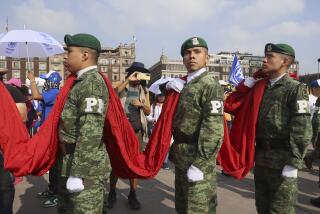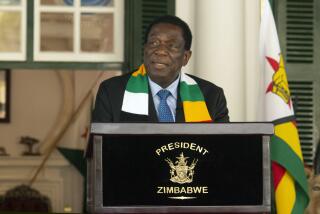Fears rise with violence in Zimbabwe
HARARE, ZIMBABWE — Militant war veterans allied with Zimbabwe’s ruler threatened to evict white farmers Sunday, and about a dozen opposition activists were beaten and arrested by police over the weekend. The attacks raised fears that President Robert Mugabe’s government was launching a violent campaign to assure his victory in an expected presidential runoff election.
Eighteen farmers were threatened and several were forced to flee their properties as they were besieged by chanting, drum-beating mobs. Representatives of the farmers said there was no police response even as the situation worsened late Sunday.
“I’m feeling a bit speechless and a bit gutted at the moment, to be honest,” said one of the farmers, who asked that his name not be used for fear of inflaming a volatile situation. He, his wife and three children moved out for safety, after hearing 50 people were approaching the farm to evict him.
“I’m still afraid. You don’t know what the future holds, do you?” he said.
Hendrik Olivier, director of the Commercial Farmers’ Union, said, “This thing can get very quickly out of control if it’s not dealt with. We can only go to the police, and it’s regrettable that we’re not getting assistance from the police.”
Mugabe has encouraged the seizure of land from white farmers in the past as part of his land reform program, with the property being turned over to his supporters.
Earlier, the government demanded a full recount of results in last month’s parliamentary elections, according to the state-owned Sunday Mail. The balloting saw Mugabe’s party lose its majority for the first time in 28 years.
The regime also called for the release of presidential results to be deferred, citing “revelations of errors and miscalculations in the compilation of the poll result,” the newspaper said.
The paper said that an examination of “anomalies” indicated that Mugabe’s vote had been understated, and it reported that some Zimbabwe Election Commission officials had been arrested.
The pressure comes after warnings from Mugabe’s hard-line security minister, Didymus Mutasa, that the commission would be purged.
The election commission has not released the results of the three-way presidential race, which opposition candidate Morgan Tsvangirai maintains he has won outright. Despite his claim, it is widely expected that a second-round election between him and Mugabe will be declared.
The opposition said a demand for a recount in the parliamentary elections had to be made within 48 hours of the vote, and otherwise was illegal. Tsvangirai’s Movement for Democratic Change went to court Sunday to compel the release of the presidential results, but there was no immediate decision.
The main pressure points in weekend violence were Masvingo, Manicaland and Mashonaland provinces, former ruling party strongholds that swung over to Tsvangirai’s party in the March 29 elections.
Roadblocks sprang up in Manicaland and other areas, and the opposition said that riot police were deployed in suburbs around Harare, the capital, that are key opposition strongholds.
Deputy Information Minister Bright Matonga called reports of violence “a lot of nonsense.”
Olivier of the Commercial Farmers’ Union said that chanting crowds had given 18 farmers in Masvingo and Mashonaland five to 10 hours to vacate their land. Among those targeted were the last 12 white farmers in a tobacco farming district near Centenary in Mashonaland.
Tobacco was once Zimbabwe’s most important export crop, but production plummeted after the invasions of white farms in 2000 that Mugabe encouraged. The farm seizures led to the collapse of agriculture and the ruin of the nation’s economy. Zimbabwe, once a food exporter, now depends on food aid to feed a third of its population.
At one of the Masvingo farms, a crew from the state-owned television station ZBC was present when a mob demanded the farmer leave, leading to fears the operation was state-organized.
Olivier feared the regime was gearing up a campaign of violence and intimidation, as occurred in elections in 2000.
“People are seen singing and chanting and beating drums, threatening to move into the homestead, demanding that it is the farmers’ time to give it up,” he said.
He said in some cases invaders had tried to force their way into houses, including one that a farmer and his family fled. “The people want to move into his house,” he said. “They’re running around the house banging on the windows. I don’t need to tell you what effect that has on a family.
“We are hoping that this thing doesn’t spread to the rest of the country,” he added. “When we look back to 2000, there are a lot of similarities.”
Another farmers’ representative, John Worsick of Justice for Agriculture, said farmers were afraid of losing everything. He said officials from the ruling ZANU-PF party had told him the government’s aim was to get all white farmers off their land by April 18, Zimbabwe’s independence day.
“We are being told that by Independence Day they want to be able to say [to the people], ‘We gave you all your land. Every white farmer is off. What more can we give you?’ ” Worsick said.
Opposition spokesman Ian Makone said his party’s activists and candidates who had won seats in ZANU-PF’s rural heartland faced the greatest threat of violence.
“It’s really the old subversion and intimidation,” he said.
The Times was unable to get immediate comment from ZANU-PF officials Sunday. However, days earlier, a senior figure warned in a phone interview that a runoff election would not be peaceful, and that land would be the central issue.
--
More to Read
Sign up for Essential California
The most important California stories and recommendations in your inbox every morning.
You may occasionally receive promotional content from the Los Angeles Times.









